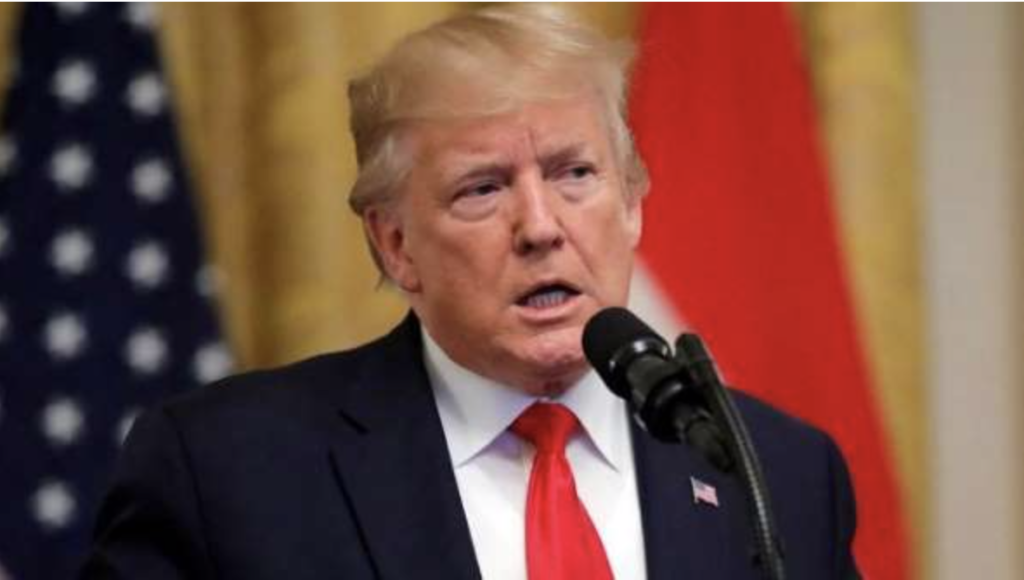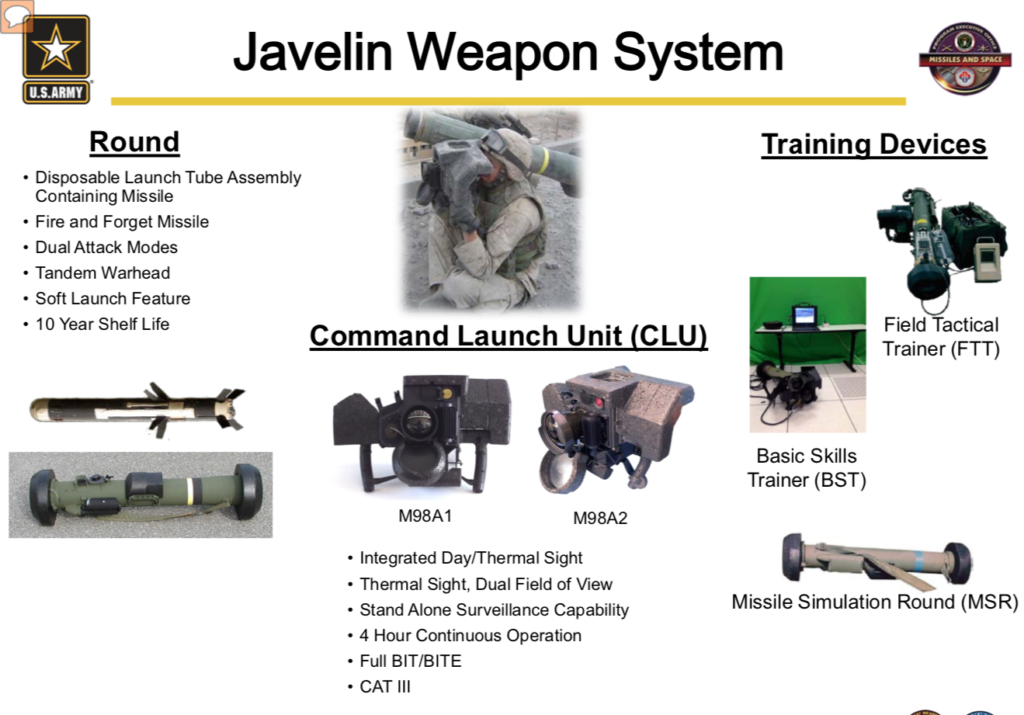Trump’s Ukraine Intervention May Violate FCPA, Arms Export Laws: Experts
Posted on

WASHINGTON: President Donald Trump’s intervention in the sale of weapons and provision of military aid to Ukraine is definitely a violation of convention, and may be a violation of laws governing military sales and international business, two of Washington’s most experienced experts in international weapons sales say.
The aid to Ukraine was approved by the State and Defense Departments, and comes in two buckets. Some $141 million comes via the State Department, and then $250 million from the Pentagon. All of it is pegged to a variety of weapons systems and non-lethal capabilities, such as communications, training facilities, and surveillance gear to help Ukraine protect its coastline from Russia’s Black Sea Fleet.
The best known part of the sale, and perhaps the most militarily significant, is the Foreign Military Sale (FMS) of Javelin missiles and Javelin Command Launch Units (CLUs) for about $47 million. Ukraine will use the FMS system to buy 210 Javelin missiles and 37 Javelin Command Launch Units (CLUs). As is the case with all FMS sales, the bill includes training, support and some logistics. Javelins, made by a Raytheon-Lockheed Martin joint venture, are excellent tank and armored vehicle killers. Tanks and armored vehicles have been a key part of Russia’s illegal invasion of Ukraine, during which as many as 13,000 Ukrainians have been killed and 30,000 wounded.
 When the two leaders spoke on the phone on July 25, the only weapon mentioned was the Javelin and it was also the moment when Trump made his pitch for help from Ukraine most explicit.
When the two leaders spoke on the phone on July 25, the only weapon mentioned was the Javelin and it was also the moment when Trump made his pitch for help from Ukraine most explicit.
“Specifically, we are almost ready to buy more Javelins from the United States,” Ukrainian leader Volodymyr Zelensky tells the American president, who knows this because he is the one who ordered a rare “review” of the sale and aid at the last minute. Trump responds: “I would like you to do us a favor (emphasis added) though because our country has been through a lot and Ukraine knows a lot about it. I would like you to find out what happened with this whole situation with Ukraine, they say Crowdstrike … I guess you have one of your wealthy people… The server, they say Ukraine has it.”
Trump’s appeal for “a favor” from Ukraine’s president, combined with his attempt to involve his personal attorney, Rudy Giuliani, and the Attorney General of the United States Robert Barr, added to his “review” of the sale — for which he has offered varying explanations — was extraordinary, two top arms export experts say.
“FMS transactions are government-to-government transactions, and matters of government contracting and delivery of equipment are handled in the acquisition process. This is a process which is designed to be walled off, to the greatest extent possible, from political interference or other forms of manipulation,” notes Andrew Hunter, former chief of staff for the head of Pentagon acquisition, and now at the Center for Strategic and International Studies. “Intervening in the flow of foreign aid packages notified to Congress is therefore not something that normally happens absent a compelling reason, and in all previous cases, such a reason would be expected to be based in statute.”
Presidents have rarely stopped or suspended FMS or other arms sales because of human rights concerns or other issues, Hunter says, and have done so in line with the laws governing arms sales. For example, President Barak Obama temporarily suspended some sales to Egypt.
But, Hunter says in an email, “Nothing in the transcript released today suggests that the President’s apparent decision to suspend defensive aid to Ukraine was based on the conditions and restrictions currently described in statute.”
A second very experienced arms export expert, who would speak only on condition of anonymity, says presidential interventions in FMS sales and military aid “never involve taking actions on a personal level on matters not within the lawful purview of the USG. Private and personal lawyers are never involved in such conditions.” This expert said the president’s personal intervention was “highly improper. One should note that ‘conditions’ can be explicit but also implicit, as is the case here. This is also true under the Foreign Corrupt Practices Act, which appears to have been criminally violated here.”
Of course, the fact we are talking about the president of the United States may complicate any legal case any prosecutor might try to bring, especially since the situation is unprecedented and involves national security.
The FCPA forbids “any offer, payment, promise to pay, or authorization of the payment of money or anything of value to any person, while knowing that all or a portion of such money or thing of value will be offered, given or promised, directly or indirectly, to a foreign official to influence the foreign official in his or her official capacity, (emphasis added) induce the foreign official to do or omit to do an act in violation of his or her lawful duty, or to secure any improper advantage in order to assist in obtaining or retaining business for or with, or directing business to, any person.”
The arms export expert said the case: “Seems pretty clear to me. If a client disclosed they had done such a thing, I would immediately bring in criminal defense counsel. For example, if I were a company supposed to deliver goods to the Ukraine government and told a Ukrainian government official, ‘I’ll deliver the firetrucks on time so you can fight the raging forest fires you have, and give you extra 30 days to pay. I have a favor to ask, though. I’d like you to investigate my competitor because ‘people say’ or ‘some people say’ they are corrupt. That would be a pretty dangerous thing.”
A violation of the FCPA would add to the allegations that Trump has violated campaign finance laws, which bar intervention in US elections by foreign parties. The Intelligence Community whistleblower, who went to the ODNI Inspector General with concerns the president was bargaining with a foreign leader for help digging up dirt on a US presidential candidate, also noted that the White House tried to hide the conversation from the rest of the government.
“In the days after the phone call, I learned from multiple U.S. officials that senior White House officials had intervened to ‘lock down’ all records of the phone call,” the whistleblower wrote. “This set of actions underscored to me that White House officials understood the gravity of what had transpired in the call.”
White House officials told the whistleblower that the contents of the president’s call were placed into a secure system used for especially sensitive information, not the computer system into which such conversations are normally stored for distribution to Cabinet-level officials.
“Some officials voiced concerns internally that this would be an abuse of the system and was not consistent with the responsibilities of the Directorate for Intelligence Programs,” the whistleblower wrote in his complaint to the ODNI IG, which was declassified and released to the public.
All of this places Ukraine, under constant threat from Vladimir Putin’s Russia, in a most awkward position. Much of Ukraine’s ability to resist Russian incursion relies on help from the United States. President Trump made clear he wanted a favor from Ukraine. But all Ukraine wants is to get its weapons and aid. As Zelensky said in a surreal appearance with Trump in New York yesterday: “I’m sorry, but I don’t want to be involved to democratic, open elections — elections of USA.”
Subscribe to our newsletter
Promotions, new products and sales. Directly to your inbox.
